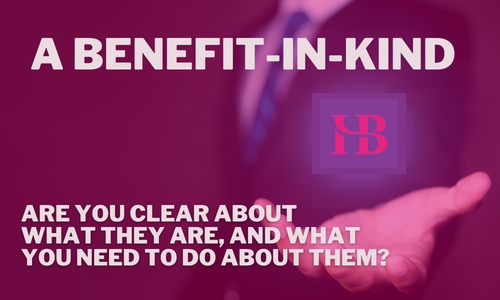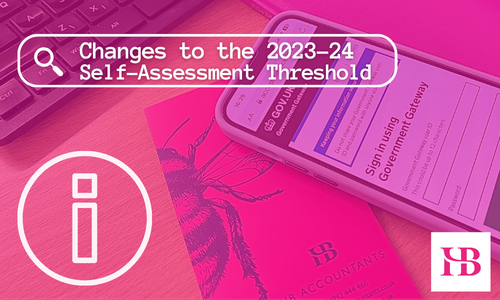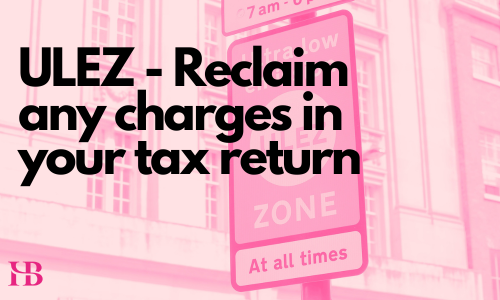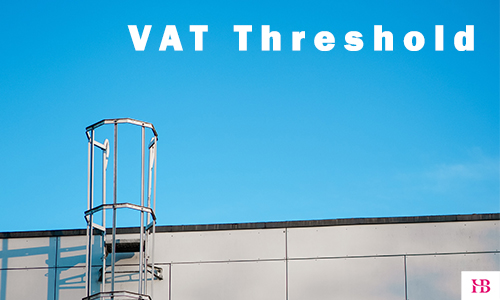Benefits-in-kind can feel like a minefield for business owners. In this blog we will tell you what you need to know, what you need to do, and show that it is possible to reward your team for doing a brilliant job without being taxed for it!

What is a benefit-in-kind?
A benefit-in-kind (BIK) is a perk or gift that is given to team members or directors personally where there isn’t a clear, identifiable business reason for doing so. They are sometimes called ‘fringe benefits’.
BIKs can come in a variety of forms, some of which are taxed – to prevent employers from using them to top up a salary – whereas others are not.
Where benefits are taxed it is applied to both the employees personal tax and their National Insurance (NI). It is also applied to your employer’s NI contributions, usually Class 1A NI contributions. You may also need to pay tax on them too.
Examples of taxable benefits-in-kind
Here are some of the BIK that are likely to incur a tax charge:
- A company vehicle used by one person
- Private medical insurance
- Non-business travel costs
- Expenses for non-business entertainment
If you pay this type of BIK to your employees, then it’s your responsibility to record and report them to HMRC.
Non-taxable Benefits-In-Kind
There are some benefit-in-kind payments that are exempt from taxation, however, there are complex rules for each one. Tax is likely not to be due on certain travel expenses, meals offered to all employees in the staff canteen, workplace training, and payments to an approved pension scheme but it is ultimately for HMRC to decide whether to levy a tax charge. Discuss your plans with your accountant before payment to discover whether they really are exempt.
How to report a benefit-in-kind to HMRC
A benefit-in-kind can be taxed through the submission of a P11D form or by paying tax on the benefits through the payroll.
An employer needs to record all of the benefits and expenses provided by filling out an expense form and keeping all the dated receipts. These should be kept for 3 years from the end of the tax year.
1. Submission of the P11D form
A P11D tax form can be used to document the expenses and employment benefits received by your employees and directors during the year. You must submit a form for each employee in receipt of benefits.
You need to submit a P11D(b) form when you submit your P11D forms to HMRC so that they can assess the amount you need to pay in Class 1A NI on the benefits and expenses.
P11D forms need to be submitted by the 6th July after the end of the relevant tax year.
2. Paying tax through your payroll
You can also deduct and pay the tax on employees benefits via the payroll. If you do this, you do not need to fill in and submit the P11D form but you still need to fill in the P11D(b).
Expenses that you do NOT need to tell HMRC about
You do not need to tell HMRC about some routine employee expenses such as phone bills and entertainment expenses if you pay a flat rate to your employee as part of their income or reimburse your employee’s actual costs.
You also don’t need to tell HMRC about trivial benefits in kind. This is a small or a token gift given by management to employees and includes bottles of wine, chocolates, beer, or team lunches. Employers just need to ensure that receipt is not performance related and that they cost less than £50.
HB Top Tips for Benefits-In-Kind
- Before you pay any benefits, talk to your accountant.
It’s important to weigh the benefits against the tax consequences before offering any benefits to your staff.
- Maintain great records
If you do pay benefits-in-kind you must keep careful records in case HMRC decides to investigate. You have to be able to demonstrate that you’ve reported BIK accurately.
If you want to discuss expenses and benefits-in-kind, do give us a call. Not only can we help with your questions about tax, we can offer you support with your payroll. You can contact us on 01992 444466. We’re accountants for business and we’re here to help.
The information contained above is for general guidance purposes only. Whilst every effort has been made to ensure the contents are accurate, please note that each individual has different circumstances and it is essential that you seek appropriate professional advice before you act on any of the information contained herein. HB Accountants can accept no liability for any errors
Read more of our blogs below or click here to search for a specific topic





